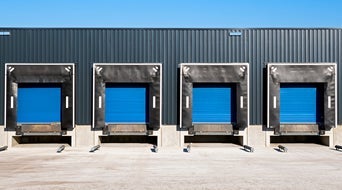BLOG POST
5 Key Ways to Avoid Dwell Time Fees

Reading Time: 4 minutes
Nobody likes waiting around or getting hung up on someone else's schedule. We all have things to do - time is money, and the clock is always ticking. This couldn't be truer for carriers. Dwell time - and the overage known as "detention time" - is a four-letter-word for truck drivers. It's a surefire way to increase your freight costs and potentially cripple your credibility with carriers.
Fortunately, shippers can mitigate or remove this problem altogether. Here, we dig into details about what carrier dwell time is and what shippers can do to keep it to an absolute minimum.
Dwell time definition
Drivers don't expect your pallets to transport on or off their trailers instantly. But they do plan for it to be quick and allocate specific time for loading and unloading. Carriers track how long they're at a pickup or delivery, also known as dwell time. However, shippers get into detention time and applicable surcharges for keeping drivers longer than scheduled. Common causes of these fees include shippers not having pallets ready, a bottleneck at loading locations or not having all documentation prepared.
What's so wrong with a little idle time?
A surcharge may feel unfair to some shippers. After all, who gets hurt by a bit of dwell time? It might feel like you're getting nickel-and-dimed with shipping fees, but look at it from the carrier's perspective: They only make money when a truck is moving, and some drivers aren't paid in full unless they're on the road. There's a domino effect that brings real repercussions.
A single delay for a less-than-truckload (LTL) shipment can get out of hand quickly. For example, an LTL carrier plans several pickups in advance to fill the truck. If you keep a driver waiting, there's a good chance the LTL dwell time will impact the next pickup and even the one after that. A driver could abandon a pickup altogether for this reason. When a carrier misses a pickup, it loses that business and takes a hit to its reputation. And it's not just the carrier whose reputation suffers - if your customer (or the next businesses' customer) misses their delivery because of your delay, everyone takes a hit. As you can see, a single ripple in the carefully planned transportation chain - be it a pickup or delivery - can quickly make waves.
How dwell time costs you, big-time
As much as we like to keep the glass half full, unfortunately, there are no positives to carrier dwell or detention time. Keeping carriers waiting will cost you - in more ways than one. Here are a few examples:
- Detention time surcharge - Each carrier penalizes shippers differently for detention time, charging a flat fee or even by the minute.
- Undelivered shipments - If a driver needs to leave your pickup, that disrupts your supply chain, profits and customer's business - and you'll still need to find a way to move your pallets.
- Redelivery fee - As we mentioned above, if the driver leaves and comes back, that'll cost you for the extra attempt.
- Other fees - Don't forget that you'll be charged for fuel consumption. This includes redelivery mileage or trips back to a terminal. See a list of common accessorial fees.
The mode of transportation, like how FTL and LTL freight differ, plays a part in the costs too. For example, an LTL detention fee usually pales in comparison to a full truckload (FTL) surcharge where you have the entire truck and drivers often travel long distances. For small package shipping, though, you won't experience anything more than a missed shipment - the driver will check to see if there's a package and keep moving if there's nothing ready.
Beyond hitting your budget, carriers may refuse to work with you in the future. They'll give you a second or third chance, but eventually, too many infractions may lead to being blacklisted by a carrier. This can be a big issue if you only like to work with one or two companies. When carrier capacity is limited, this could mean you're the shipper holding the short stick and looking elsewhere to move your materials.
What you can do about dwell time
The good news is that shippers can take action to control or reduce shipping costs by optimizing dwell time. It all comes down to tidying up internal processes and thorough communication. We can't tell you how many times we've seen shippers book a shipment, commit to a two-hour pickup window and then fail to be ready when the driver pulls up. Follow our tips to build detention-free operations:
- Ready your pallets. All your freight should be packaged appropriately and waiting to sidestep any issues with dwell time or detention time overages.
- No last-minute printing. The driver doesn't have time for you to run to the printer across the office, print the shipping label or bill of lading and attach it to the shipment. Build a shipping process for all the little things.
- Stop chasing workers. If you need warehouse workers and forklifts to load a shipment, make sure they're ready at the pickup ahead of time. This may take some extra communication because they likely can't wait two hours for a truck to arrive. But, it's on you to make sure those resources are ready.
- Get on the horn. Talk to your customer or cosignee to make sure everyone is prepared for delivery.
- Be thorough. Think about the logistics of the pickup and delivery locations. Are there security gates or other factors the driver needs to know about for his route? Is there a specific bay? Is the driver weaving through a maze-like corporate park? Documenting little details helps build strong relationships with carriers.
Build strong freight shipping operations
Shippers can learn about dwell time the hard way, but it's far easier (and profitable) for them to remove the possibility by taking a hard look at their shipping strategy and workflows. As a third-party logistics (3PL) partner, we help small and mid-size businesses eliminate issues like this and educate businesses so they can build stronger shipping operations. If you're trying to reduce shipping costs and build a more efficient shipping routine, we want to help. Contact us and let us know about your challenges.





